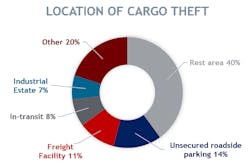To be an insurance company crime-and-theft specialist means measuring the ever-shifting trends in cargo burglary nationwide, tracking the hotspots where this crime occurs, keeping eyes on what thieves tend to take and where and when, and working with dwindling law enforcement to stem the tide.
That’s the job—and it’s all about trends in anticipating where cargo theft might occur, said Scott Cornell, national practice lead-transportation inland marine for trucking insurer Travelers Cos.
See also: Security experts advise caution ahead of holiday weekend
Cornell’s a kind of cargo theft gumshoe—he said his employer is the only insurance company in the world that has a fully dedicated unit for cargo theft investigations and recovery. During a time when state law enforcement devotes far less personnel and taxpayer resources to investigate crimes of this type, he’s uniquely on the front lines of the battle to prevent people from breaking into trailers or cargo carriers and heaping huge losses onto trucking companies.
Cornell was invited to lead two sessions, both titled “Cargo Security from the Enforcement Perspective,” at the 2022 Truckload Carriers Association Safety & Security Meeting in Nashville.
“The face of cargo theft is changing,” Cornell told a gathering of trucking safety stakeholders during one session on June 6. “In the U.S., cargo theft is all voluntarily reported, cargo theft numbers are like a man-on-the-street poll. It’s all about the trends and where thefts are reported more often.”
Slides that Cornell showed during the session—based on data from CargoNet, a theft prevention and recovery network under parent company Verisk—revealed that cargo theft increased during the COVID-19 pandemic, most notably in 2020, and that cargo burglary occurs mostly around large cities with big populations and sizable economies, though it occurs everywhere, in every state.
“We have seen cargo theft in all of the lower 48,” he added.
Cornell said that, statistically, California is the cargo theft capital of the country, though Texas and Florida aren’t far behind, appearing as big blobs of incident reports on a slide he showed during the session. He cautioned, however, that the data depends on where cargo theft is likely to be reported and in areas that are more densely populated. It’s happening everywhere, he said.
He also said the average value of the cargo stolen has gone up. Between 2010 and the pandemic year of 2020, the top items stolen from cargo shipments were food and beverages. In 2020, the top stolen item shifted to household goods. “They steal what people want and need every day,” Cornell said.
See also: How high-tech tools combat cargo theft
Cornell reported that the average value of cargo stolen started to rise last year when electronics were the favorite of thieves, and that trend has accelerated with inflated prices into 2022 with “high-target commodities” such as higher-end electronics among the top choices of criminals to target.
A February 2021 report on worldwide cargo theft by BSI and TT Club Cargo broke down the global trends in micro detail.
The rates of theft have risen overall. Theft activity in the first quarter of 2022 was 5% greater than the fourth quarter of 2021 and over 15% higher than pre-pandemic levels, according to CargoNet. Last year, nearly 1,300 incidents of theft were reported to CargoNet in the U.S. and Canada, with about 50% of thefts occurring in California, Texas, and Florida.
“Last year, nearly $58 million worth of cargo was reported stolen to CargoNet across the United States and Canada, and they’re already seeing an uptick in incidents this year,” Brian Heath, CEO of Drivewyze, who has teamed with Verisk to provide cargo theft alerts in its Safety+ service, told FleetOwner recently. “That scratches the surface. The problem is much bigger than that since cargo theft often goes unreported.”
Report cargo theft before 24 hours pass
Speaking of reporting, what’s the top technique that fleets can utilize to increase their chances of retrieving their cargo? Don’t delay reporting these crimes, Cornell advised. “Delayed reporting is a big problem because, beyond 24 hours, chances of recovery go way down."
A top place where pilferage occurs? Travel stops, where professional truck drivers rest, shower, and eat, he added. “Thieves watch drivers for when they do that stuff and conduct thefts during that period.” Fleet managers and dispatchers should ask their drivers to rest, eat, and shower before they pick up loads as a low-tech way to cut down on the chances that their cargo will be stolen, Cornell advised.
See also: The state of cargo security: How fleets can respond
Technology is playing a part, too, in theft prevention. Trailer tracking and specialized trailer door locks that can tell dispatch when a door was opened and where are seeing wider adoption. For example, risk-management platform Overhaul uses its Law Enforcement (LE) Connect to provide law enforcement cargo theft task forces around the U.S. with instant access to data (real-time shipment information, location, and sensor data) to expedite theft recovery.
Recommendations for every fleet to protect against cargo theft:
- Arrange for same-day delivery of short-haul shipments.
- Embed covert tracking devices in the shipment.
- Use high-security locks on trailers.
- Drivers should adhere to the “red zone” rule and avoid stopping within 250 miles of pickup.
- Drivers should be aware of any vehicles that appear to be following them.
- Thoroughly vet all carriers and brokerage services.
- Compliance monitoring is crucial to detect non-compliance indicators of a theft in progress.
- Identify a path to effective law enforcement engagement.
- Confirm identification through multiple forms of ID of drivers who pick up loads, including driver picture and CDL picture, tractor number, VIN, and license plate. Individuals wearing face masks should be asked to remove the mask for positive identification.






